Message to our politicians: If you have deluded yourself that you could ever harness the angry women’s vote, take a good look at the Albanese debacle last week.
Our Prime Minister indulged in classic virtue signalling by sucking up to the Canberra women’s protest rally, joining hundreds of women who had been cynically whipped up into a frenzy over the latest domestic violence tragedies – with the usual false claims of an epidemic of violence being used to fuel anti-male hatred and demands for more funding.
Albanese muscled in on the podium to mouth his usual platitudes, only to have Sarah Williams, a canny activist and one of the rally organizers, call him a liar for claiming the protest had refused to allow him to speak. “Victim-survivor” Williams turned on the water works, claiming the PM was victim blaming, which led to days of grovelling and humiliation for Albanese. Slam dunk, for Williams. Another Prime Minister done over trying to suck up to the feminists.
(Note that Williams is the same professional agitator who, only a few weeks earlier, was orchestrating the change.org petition against our Restoring the Presumption of Innocence conference. She’s a busy girl.)
I’m not going to buy into detailed discussion of the truly impressive flexing of feminist power on display in the last fortnight, with commentators attempting to outdo each other in their male-loathing, proposing ever more draconian measures to lock up accused men, deny bail, publish their details online. Grovelling politicians responded by handing out more and more of our money and promises to further curtail civil liberties.
Never mind that in the middle of all the hysteria, the Australian Institute of Criminology released the latest figures which demonstrated a 30-year decline in intimate partner domestic homicide – “The female intimate partner homicide rate decreased overall by two-thirds (66 per cent) in the 34-year period between 1989-90 and 2022-23.”
Statistically speaking, this year’s tragic cases are a tiny blip in the downward trend. But that went virtually unnoticed, apart from an excellent article by Angela Shanahan in the Weekend Australian which the current feminist editors omitted from her normal spot in the print version and only published online.
You must watch this compelling video from Damian Coory, a commentator on ADH TV (the relevant section starts at 15:33). We are excited to announce that Damian, who has had a long media career, will be speaking at our conference about the role of the media in demonizing men.
And who would have thought that Waleed Aly would dare to suggest that blaming all men for domestic violence was like blaming all Muslims for Islamic terrorism.
But the icing on the cake was when Jess Hill, one of the leading feminist propagandists in the domestic violence industry, openly conceded that the advocated primary prevention strategy of promoting respect for women and attempting to “reduce gender inequity” wasn’t working: “Telling men and boys that if they make sexist jokes, or fail to challenge the attitudes of their mates, they are personally responsible for the physical and sexual violence or homicides committed by other males has not proven a compelling or successful argument.” Duh….
So, all those billions spent on television campaigns and shaming boys in schools has turned out to be misguided. Hill and her fellow author, UNSW criminologist Michael Salter, raise the possibility that it is increasing resentment by young men – which could backfire: “Situating all little boys as potential perpetrators not only risks diluting much needed resources and effort, but it also invites confusion and potentially backlash from boys and young men who were never at risk of hurting their partners in the first place.”
Yes, growing up in a culture where the government is paying for programs which falsely claim you and your mates are responsibility for the rape and murder of women might just put you off that government, don’t you reckon? And put you off voting for all the parties lining up to jump on this feminist bandwagon.
When will politicians realise that they will never appease the extremist feminists and misandrists who control not only social media but most legacy journalists? Well, while they remain fearful of extremists and their influence, the answer is – never.
Of course, even our conservative politicians are driven by fear – fear of looking out of touch. To hell with the facts, with issues of fairness, and even with what is best for our nation.
Which brings me to the Liberal Party, which sadly is the only hope of getting rid of the Labor government which has proved far more dangerous to men than we could ever have imagined – think of last year’s family law legislation removing children’s right to have a father in their lives. Every day this mob thinks of new ways of making lives miserable for men and boys.
Tough times for conservatives everywhere
There’s good reason for Liberal party strategists to be concerned about their future. Times look bleak for conservative parties, with growing evidence that successive generations are moving further left– both in Australia and overseas. What’s worse is they don’t appear to move back to the centre-right as they age. Forecasts are grim and include “a 35-seat reduction in Coalition seats in the House of Representatives by 2040,” according to a Centre for Independent Studies report on young people deserting the right.
However, the statistics reveal an interesting, more complex trend. In January, a Financial Times article pointed to evidence that while the young women of Gen-Z are, as expected, more left than previous generations, the young men are defying expectations by turning to the centre or even right.
Other surveys have confirmed this trend. American surveys by Survey Center on American Life, Newsweek and Glocalities report a split between young men and women. An analysis of global data by The Economist also shows a gender split but finds that the difference in Australia is less than some other countries.
In Australia, Dr Intifar Chowdhury, a lecturer in government from Flinders University, analysed Australian Election Study (AES) data and concluded:
However, while Gen Z has more men than women on the right, it has less right-leaning men than any other generation – so it would be wrong to say our young men are rushing to the right, like in South Korea or Germany.
A tiny ray of sunshine?
There are other ways of looking at this data. We’ve used the same AES data set but rather than placing respondents on a left-right spectrum, we have focussed specifically on survey questions about attitude towards the Liberal Party.
And that revealed a small glimmer of hope for the Libs.
Young men, on the cusp of adulthood, are far more favourable to the Liberal Party than most other age groups – and their political leanings differ strongly from their female cohort. I am reminded of the audience in many of Jordan Peterson’s talks here in Australia – who could forget all those eager young male faces looking for acceptance and enlightenment?
Our analysis shows young (18-22yo) men are about equally divided on their attitude towards the Liberal Party – 42% dislike the party to some extent and 39% like it to varying degrees. Such indifference may not seem like cause for celebration, but it is significantly more positive than either the female cohort or the next older group of men.
And look at how these young people actually voted, with the conservative parties attracting a solid swag of young men while more young women shun Labor to support the Greens and Teals.
So, youngsters do offer hope for the Libs. But, as they mature, these young men go off the party. It’s not hard to see why.
The great gender divide
There’s plenty of media speculation about “gender divergence” in this young generation. The Financial Times points out that previous younger generations had a shared identity in terms of its politics and general ideology, but “Gen-Z is two generations not one”.
The reason? Most suggest it is all about gender politics, with the rage generated by #MeToo radicalising young women and repelling young men. Surveys in Australia, USA and elsewhere show young women becoming more extremist and young men more likely to be hostile to feminism.
It’s easy to see why:
Young men have been more impacted by feminist policies than older cohorts. An American survey showed that about half of young men have suffered anti-male discrimination – a sharp increase from just 4 years ago: “Increasingly, men are reporting mistreatment in their daily lives.” In South Korea, nearly 80% of men in their 20s report they are discriminated against.
Another American survey found that half of men agreed with the statement: "These days society seems to punish men just for acting like men."
In the UK, most men under 30 report that feminism’s effect has not been positive.
An Australian survey concluded that “younger generations of men view themselves as outsiders”.
A 32-country survey found a majority of world citizens – 54% — believe that “when it comes to giving women equal rights to men, things have gone far enough in their country.” These views are especially strong among persons under 40 years of age.
In some countries, gender politics is now a mainstream political issue, reflected in their voting patterns. The clearest example is South Korea where young men have pivoted sharply to the right – see earlier chart - as reported in The Economist. Similar trends have played out in Argentina, Poland and Germany.
The result is significant policy changes. Argentina’s new president, Javier Milei, delivered a blistering attack against radical feminism at the World Economic Forum in Switzerland early this year, pointing out that feminism has become a noxious force because it engenders conflict between men and women. In South Korea, Yoon Suk Yeol vowed to promote tougher penalties for those making false accusations of sexual misconduct. An anti-alienation law has just been passed by the Romanian government, where parental alienation is now included in child protection legislation.
But what is truly exciting is news from Norway which has released the final report from their Men’s Equality Commission. Here’s one of the Left’s favoured progressive countries announcing a clear rejection of zero-sum thinking – working on behalf of boys and men does not dilute the ideals of gender equality, it applies them. Here’s how the Commission framed the argument:
Many boys and men do not feel that equality is about them, or exists for them. The men's committee believes that equality's next step should be to include boys and men's challenges to a greater extent than today. . . Greater attention to boys' and men's equality challenges will strengthen equality policy, not weaken it.
Read Richard V Reeves’ thrilled announcement of this evidence-based report, which spells out gender gaps in a range of key areas: education, work, health, leisure, crime family life and social isolation. And makes strong recommendations, including more men studying for careers in health, education and social care. Plus, gender neutral equality law – now how’s that for a radical suggestion?
Not that we’d expect anything radical from the Libs – don’t forget it wasn’t long ago that Liberals were apologising to Brittany Higgins in parliament, funding a second National Plan to End Violence against Women despite the abject failure of the first and voting for Labor’s anti-father family law bill. This leopard isn’t going to radically change its spots.
But perhaps they could come up with a few crumbs for those wavering young men looking for some sign that a future Coalition government won’t continue the divisive gender politics of Labor.
Some reasonable suggestions include:
An inquiry into barriers to males embarking on teaching careers.
Measures to address the increasing disengagement of boys at school.
Introducing blind recruiting into the public service.
Ensuring equal opportunity in education and employment.
And maybe even the most radical suggestion of all: evidence-based domestic violence policies?

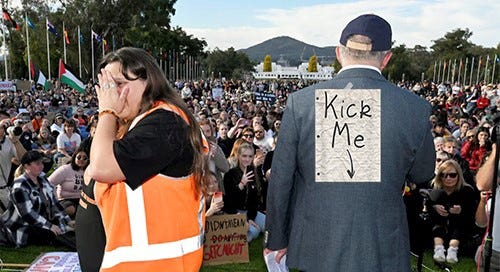



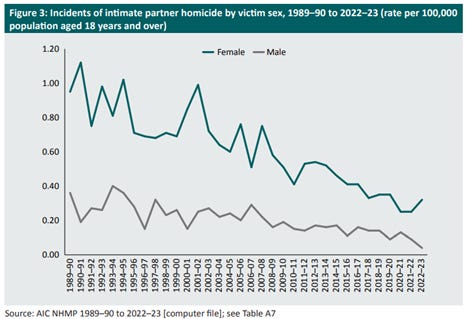
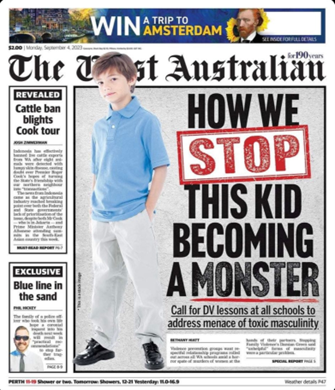
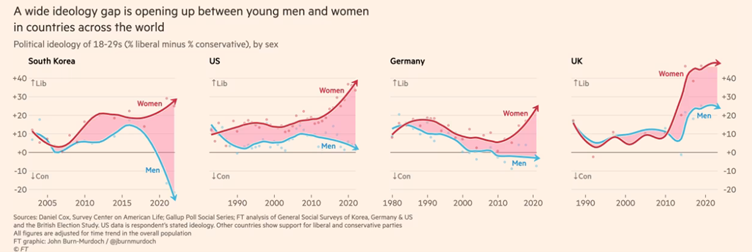
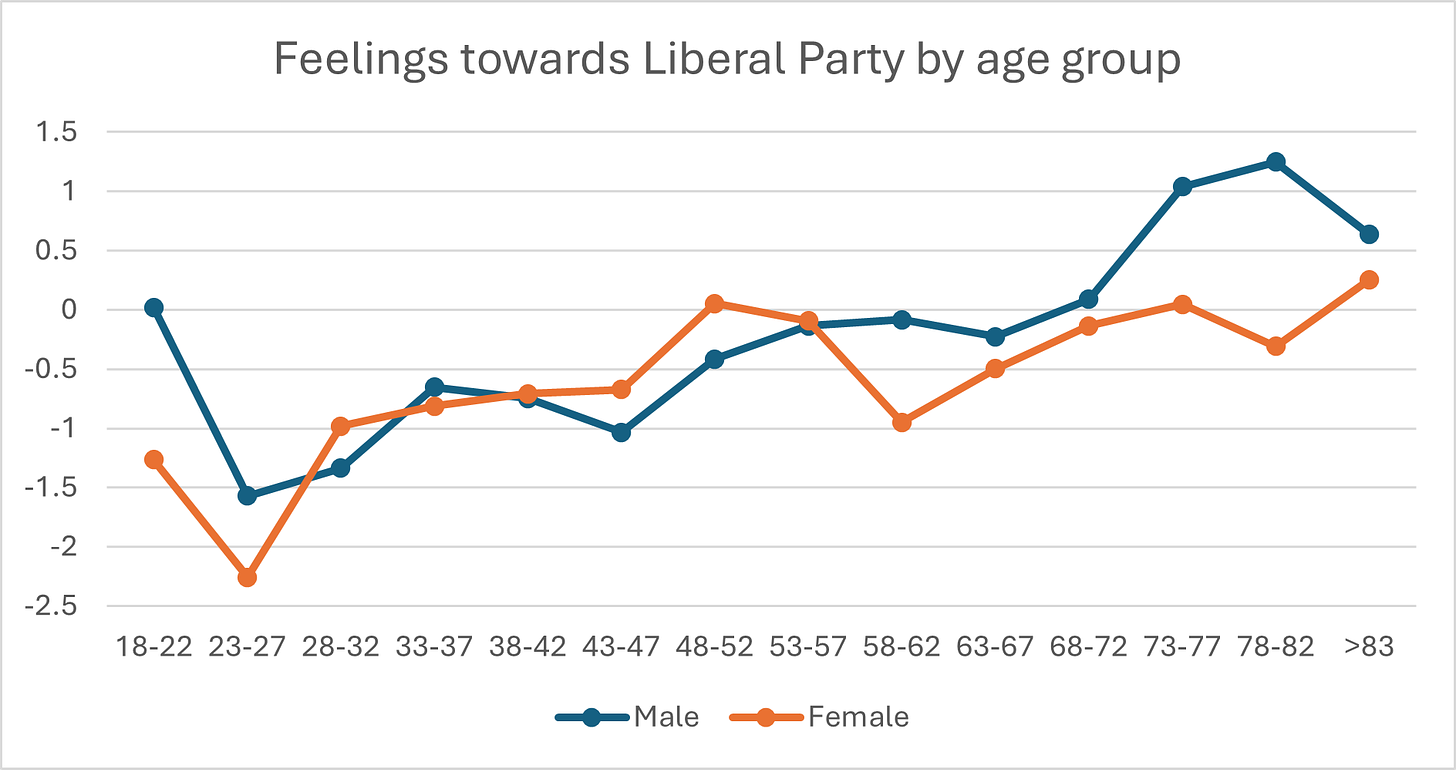
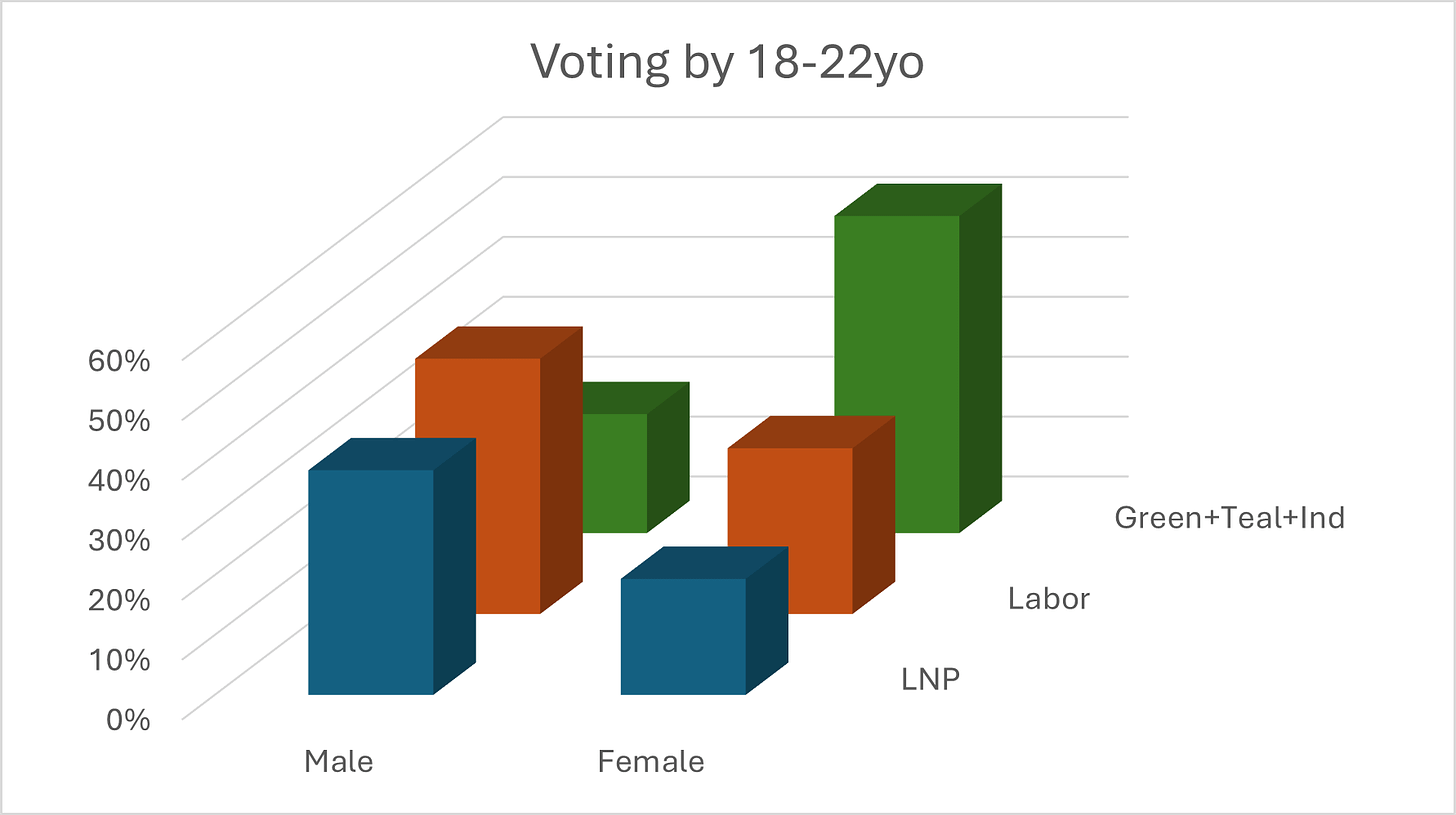
Alas, Bettina I am not sure that the Liberal party has any interest in supporting men and boys. It is a sad indictment of our society that the only politician who appears willing to publicly advocate for the rights and interests of men and boys is Pauline Hanson.
I’m not advocating for Senator Hanson, rather I am making the point that no mainstream party dares publicly support men and boys. You highlighted the public shaming of the Prime Minister, and this is a microcosm of what awaits any politician who does not publicly advocate for prioritising the rights and interests of women and girls.
Given Katy Gallagher is sometimes identified as one of the “mean girls”, you would have thought that Mr Albanese would be well aware of what male-shaming and female bullying looks like. The take away is that what you, Pauline Hanson and Karen Straughan have in common is that you are “not-men”. I was going to write that only “not-men” can publicly advocate for issues that affect Men and boys without attracting the attention of the feminist hate machine.
But that’s not true, is it? Feminists are equal opportunity haters if you decline to genuflect to their orthodoxy. I thank you for your bravery and continued advocacy. But I doubt that the Liberal Party will be egalitarian, let alone male-supportive.
They don't want equality.
They want revenge.
Largely for things that never happened in their lifetime.